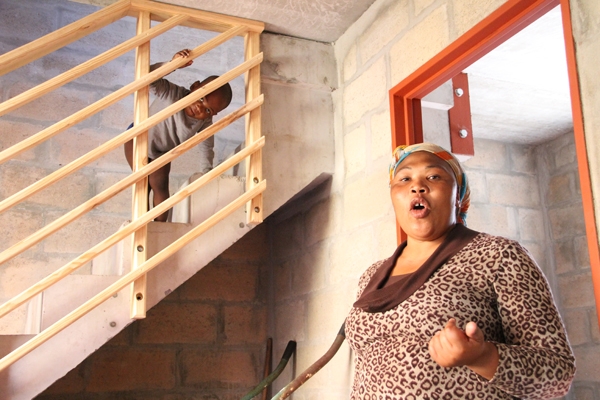Moving up in Joe Slovo

Approved Joe Slovo housing beneficiaries, who were deemed to be “too young” by government to receive houses in October, this week moved into their new units at the N2 Gateway development. Other families, who remain behind in the informal settlement, and who are now being moved to make space for the next phase of the housing development, remain unhappy.
In the last week of October, Zimasa Zibeko, 32, and dozens of their neighbours were denied access to houses at the Joe Slovo N2 Gateway development in Langa. The houses, they believed, were due to them, and they threatened to resist being moved out of shacks on land earmarked for the next phase of the development.
GroundUp investigated and found that that Human Settlements MEC Bonginkosi Madikizela had deemed the beneficiaries too young to “be prioritised” for government houses.
But Madikizela has now confirmed that those beneficiaries (56 in total) were approved before government’s policy shifted to prioritise people over the age of 40 for housing.
“This is incredible,” said Zibeko, as she gave GroundUp a tour of her new double-storey, two-bedroomed apartment at the N2 Gateway development. She received the keys on Monday.
“We were worried [in October] that this day would never come. Here we have a toilet and running water. We are warm at night, and this has already had a good impact on me and my children’s health. I have asthma, and when the wind blew through my shack at night, I used to cough until the early hours of the morning.”
The novelty of a house has been particularly entertaining for her three-year-old son, Yomelela. He has been flushing the toilet with glee, and been mesmerised by the door handles, the likes of which he has never seen before, according to Zibeko.
Nomonde Mahlati in the shack from which she is to be removed to make space for the next phase of the Joe Slovo housing development, in Langa. Photo by Daneel Knoetze.
“My child was always sick; the flu would not go away and he had a runny tummy sometimes. It is all because of the conditions where we lived in the shacks. It was not healthy … We had to walk far just to go to a portaloo or a water tap.”
For other residents of Joe Slovo informal settlement who have not yet received houses, such unhealthy conditions persist. Approved for housing at the new development, 41-year-old Nomonde Mahlathi has lived in the area since 1995. When her shack was demolished by the Housing Development Agency to make space for the housing development, she spent four nights outside in May 2013. She now stays in a small two-roomed shack with seven family members, four of them children. As the land is cleared for the next phase of houses, she will have to move again.
“We are disappointed … Some of those beneficiaries were very young, in their early twenties, and they do not even have families to look after,” said Mahlathi.
“What about my children? My son Ndim, who is now six, still has memories from being evicted,” she said, recounting how her son, aged four at the time, came home from creche to find his mother’s shack lying in tatters.
“He has become a withdrawn and scared boy at school. Living like this is not good for his health and he is psychologically damaged from us being removed so violently. Now, we have to move again — to a small shack in a congested area where the risk of fires is very high.”
Next: Why domestic workers keep fighting
Previous: Aftermath of a shack fire

This article is licensed under a Creative Commons Attribution-NoDerivatives 4.0 International License.


